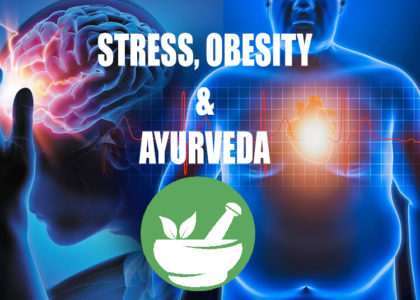मात्रास्पर्शास्तु कौन्तेय शीतोष्ण सुख दुःखदाः। आगमापायिनोऽनित्यास्तांस्तितिक्षस्व भारत ॥
Bhagvad Geeta 2/14
So true is this verse from Bhagvad Geeta. In short it says one must learn to tolerate as anything that we experience with senses is not permanent. Tolerance needs patience; patience to wait till that phase pass.
Today the world has become a race for survival. People worldwide are facing lot of emotional ups and downs. There is insecurity, fear of death, fear of losing dear ones, stress of money management, strained relationships. There is flood of emotions everywhere. Not everyone is capable of handling these emotions in a healthy way. Role of psychiatrists, psychologists and counselors is very important these days.
Ayurveda the oldest health science has described how to handle or train one’s mind to develop tolerance or patience. In this blog we’re going to see what exactly Ayurveda describes about mind.
- Mind is a sixth sense organ. It controls all the five senses (eyes, nose, skin, ears & tongue). Mind is the one that connect these senses to the external world by controlling & coordinating. Here it acts as a sensory organ. It is responsible for activities through speech and actions & acts as motor organ. This way it performs both important functions, jnyanendriya (sensory) & karmendriya (motor).
- Mind is the origin of thoughts. There is no action without a thought behind it. It proves that karmendriyas act only when mind is well connected with them (I do not see/hear if mind is elsewhere)
- Mind is a coordinator between soul (aatma) and intellect (buddhi). When these three are in harmonious alignment, peace can be experienced.
- Most of the times Soul and intellect differ a lot. This put huge burden on the mind. Checkout any stressful situation you have faced in the past. Your intellect tells something exactly opposite to what your heart (actually the soul) says.
- Charaka says, one who has control over his mind do not contract/manifest any diseases. We have seen many patients of covid 19 or cancer etc, when patient gives up mentally, no amount of external help is useful. Weak mind leads to a bad prognosis.
Seats of mind according to Ayurveda
hridaya & Shirasa (heart & head respectively).
{Ref.cha.su.30/4 – heart & cha.su.17/12 -head}.
objects of mind according to Ayurveda-
चिन्त्यं विचार्यमुह्यं च ध्येयं संकल्पमेव च।
यत्किंचित् मनसो ज्ञेयं तत् सर्व हि अर्थ संज्ञकम्।।
Cha. Sha. 1
It says mind thinks about an action to be taken or not, whether it is reasonable or not, it imagines the same (hypothesis),dhyeya is an object for which it has attachment or attention, mind also determines that the object to which it is attached is good or bad.
Activities of mind according to Ayurveda-
इंद्रियाभिग्रहः कर्म मनसः स्वस्य निग्रहः।
उहो विचारश्च ततः परं बुद्धिः प्रवर्तते।।
Cha.sha.1/21
Above shloka says the function of mind is controlling senses and self restraint. Also hypothesis (uhya) and consideration are functions of mind.
Saar bhaga (purest forms) of vata, pitta & kapha (prana, teja & oja respectively) have key role in mind’s perception, coordination, evaluation & expression of thoughts and emotions.
Sharirik doshas (vata, pitta, kapaha) and manasik doshas (raja, tama) in equilibrium provides good mental and physical health whereas their vitiation cause diseases.
When raja and tama are in equilibrium they cause kama, krodha, shoka,bhaya etc in minimal quantity which is required in life, but excess of them cause disorders.
One interesting presentation representing the decreased connectivity of mind today-
The ideal course of work of mind should be-
Intellect (buddhi) takes decision by evaluation – it passes that to mind – mind then passes it to sense organs (indriyas) who act accordingly.
Now in present era, the sequence is reversed totally. It is like –
Sense organs (indriyas) dominate decisions- it passes it to mind- and intellect has to act accordingly.
This is a glimpse of a platform where spirituality meets science. Actually we can see this as; we are greatly controlled by our intense desires now a day. We are so much abided by our wrong eating habits, lifestyle or behavior also, that inspite of knowing that what we are doing is incorrect (decision by intellect) we still follow the same wrong path (dominance of indriyas). It creates guilt in mind. Well….this is just an example.
Ayurveda as well as spiritual science both give enormous importance to Mind. Training your mind is very important to achieve success in both fields, be it detachment or good mental & physical health.
Few techniques suggested by Ayurveda to have good mental and physical health.
- Pranayam
- Dhyana(meditation)
- Chanting mantras (vibrations of certain mantras have effect on brain and mind. So they are included as a part of daivavyapashraya chikitsa )
- Eating satvik aahara (mild and nutritious food) which include healthy fat (nuts, dry fruits, seeds, olive oil etc) as they are rich in micronutrients. Avoid excessively spicy, oily or stale food. Always prefer fresh food over packaged & processed food.
- Have your food when you are calm and in positive company. Avoid use of gadgets while eating.
- Exercise compulsorily according to your age and body pattern.
- Practice good sleep.
- Keep your bowel fit.
- Do not hesitate to visit a vaidya (doctor) or counselor if you find things going wrong somewhere.
- Different Ayurvedic herbs like bramhi, jatamansi, shankhapushpi, jyotishmati etc are useful. Also some preparations like kalyanaka ghrita, bramhi ghrita, manasmitra vatakam, jatamansi ghan vati, swrnayukta bramhi vati etc are beneficial.
- Panchakarma therapies like nasya and shirodhara are very useful.
Only after proper consultation by a physician one can consume medicines mentioned above.
This is actually a very vast topic. To describe it in such a small article is a tough task. I hope it gives you a brief idea about mind and Ayurveda connection.










